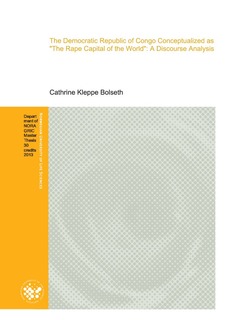| dc.description.abstract | With its Women, Peace, and Security resolutions, and the establishment of the position of a Special Representative on Sexual Violence, the United Nations (UN) has positioned conflict related sexual violence (CRSV) on the international agenda as a central international peace and security issue. In recent years, there has been a proliferation of agencies and high profile
initiatives that try to understand and address this complex issue, and consequently it has been publicly contemplated by an even larger group of academics, policy advisors and policy
makers.
This thesis argues that central statements from UN officials, relevant resolutions and policy
documents can be seen as discursive practices. How policies are formulated and statements
are given can therefore be argued to have implications on the development of the international
community’s response to the widespread CRSV found in the Democratic Republic of Congo
(DRC). This thesis offers the argument that it is necessary to problematise the assumptions
and beliefs that underpin the approach to CRSV, as these form the basis for UN policies and
official positioning. Furthermore such assumption and beliefs typically have broad, but often
hidden, impact on the discourse of CRSV, which is reflected in international policies and
efforts on this area. This thesis highlights the fundamental conceptualizations that underpin
the UN’s approach to CRSV in the DRC. Moreover, it asks if the UN’s narrative is cementing
the structure of international discourse about this topic, and if it disregards fundamental
elements of the picture. These issues are explored by applying the method of discourse
analysis to the UN’s first Special Representative on Sexual Violence statements that
strengthen the current discourse, but also through mapping the main points of criticism
against the established approach to this dehumanizing and destabilizing aspect of the DRC’s on-going conflict. | no_NO |
